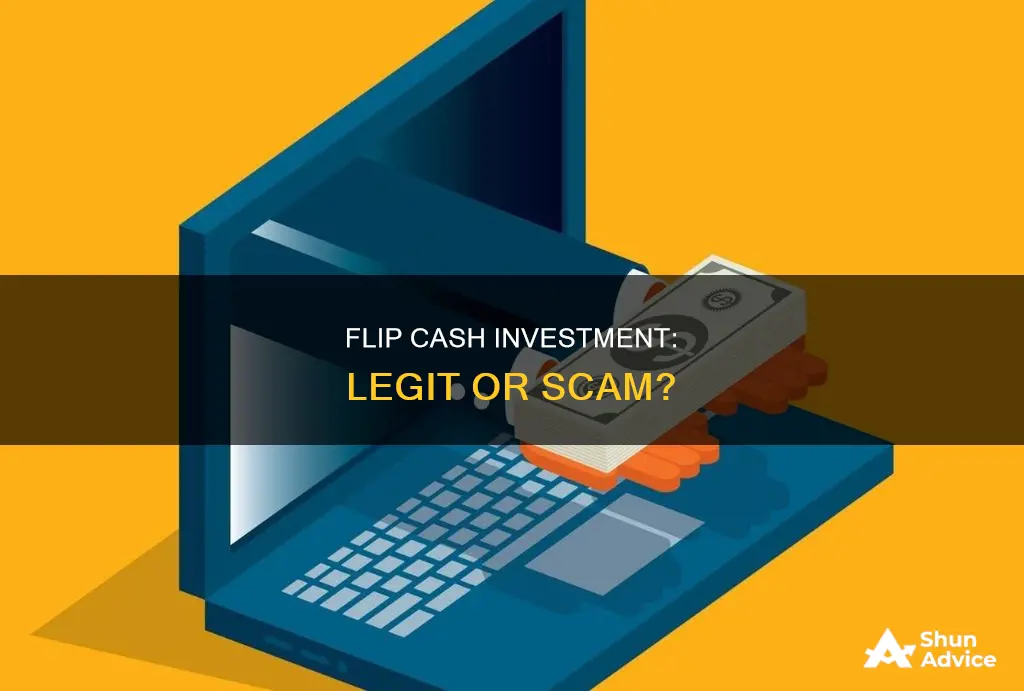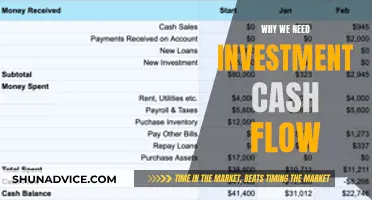
Money flipping scams are a type of fraud where scammers promise victims that they can turn a small amount of money into a large sum within a short time. Scammers will pose as financial experts and make initial contact with victims via social media platforms, email, or WhatsApp. They will then ask victims to send them a small amount of money as an investment, promising to return it with a large profit. However, they will ultimately disappear with the victim's money and no return on the investment. These scams prey on people who are desperate for money and often target individuals seeking quick and easy ways to make money. While they may seem appealing, it is important to remember that there is no such thing as free money, and if something sounds too good to be true, it probably is.
| Characteristics | Values |
|---|---|
| Type of Scam | Money Flipping Scam |
| Targeted Users | People seeking quick or easy ways to make money |
| Modus Operandi | Promise of doubling or tripling the investment in a short period of time |
| Red Flags | No website or verified social media accounts, poorly written messages with grammatical errors, promise of high profits in a short period of time |
| Outcome | Victims lose all their investment |
What You'll Learn

Flip Cash Investment is a scam that targets Nigerians on Facebook
Flip Cash Investment: A Scam Targeting Nigerians on Facebook
Several Facebook posts have been urging Nigerians to invest their money in something called the "Flip Cash Investment Platform Worldwide". However, this is a scam, and those who fall for it risk losing their money.
How the Scam Works
The scammer will often initiate contact through social media platforms or online forums, targeting individuals seeking quick or easy ways to make money. They may present themselves as successful investors or mentors with exclusive access to lucrative investment opportunities. They will then showcase fake testimonials or fabricated success stories to gain your trust.
Once they have established a level of trust, they will make the initial request for investment, emphasizing the limited-time nature of the opportunity and the potential for high returns. They may ask for relatively small amounts initially to lower your guard and encourage further investment. For example, they might say you can double your investment in one hour.
After receiving the funds, they will disappear or block the user, leaving the victim with no access to their money or the scammer.
Red Flags
- The promise of high profits in a short period of time.
- Poorly written messages with grammatical errors.
- No website or verified social media accounts.
- No record of the platform on Nigeria's business register.
- Requests for upfront payment or personal financial information.
- Lack of regulatory compliance.
Protect Yourself from Scams
- Be vigilant and do your research. Verify the legitimacy of any investment opportunity and look for red flags.
- Consult with a trusted financial advisor or seek guidance from consumer protection agencies before making any investment decisions.
- Report suspicious activity to help authorities disrupt scammers' activities and prevent others from falling victim.
Preventing Cash Crunch in Illiquid Investments: Strategies for Success
You may want to see also

Scammers promise to double or triple your money
Scammers often promise to double or triple your money in a short amount of time. This is a common tactic used in money-flipping scams, where scammers will contact you via social media or messaging and claim that you can make a large profit from a small investment. They will try to entice you with attention-grabbing headlines and images of luxury items. For example, you might see a post saying "Double or triple your $20 investment in minutes!" accompanied by pictures of people swimming in money.
These scams often involve the scammer pretending to be a professional investor and asking you to send them money to invest in a "sure thing". They may even provide fake proof of their success, such as bank balances, stories, or screenshots. They may also try to manipulate you by saying things like "Hey! I saw you were interested in making some quick cash. For a small $50 investment, I guarantee I can turn that into $500 overnight with my proven strategy! Just look at all these people I've helped get rich."
Once they have gained your trust and received your money, they will disappear, leaving you with nothing. They may even block you so that you can't report their account. It's important to remember that if it sounds too good to be true, it probably is.
To avoid these scams, be cautious of anyone contacting you with offers of quick and easy money, especially if they ask for personal or financial information. Do your research before sending money to anyone, and remember that legitimate organisations will never ask for personal information like your PIN or CVV via call, email, or text.
Investing: Negative Cash Flow's Impact and Insights
You may want to see also

Victims are asked to send money via Cash App
Cash App scams are a persistent threat, with scammers compromising user identity, credit card information, and more. Scammers will pose as financial experts and make initial contact via email or through social media platforms like Instagram, Facebook, and Twitter. They will fake expertise and claim they can turn a small amount of money into a large sum within a short time. They may also provide fake testimonials, credentials, and evidence to reel the user in further.
Once the scammers have gained the victim's trust, they instruct them to transfer a certain amount of money to them to flip. After receiving the funds, they disappear or block the user.
- Loan scams: Scammers will claim they can secure a loan, regardless of the user's financial situation, with an upfront fee. They will instruct users to transfer the upfront fee via Cash App's transfer feature and then disappear with the funds.
- Rental deposit scams: Scammers post listings for rental properties at attractive prices, often on legitimate real estate or classified ad websites. When responding to the listing, the scammer, posing as the landlord or rental agent, claims they cannot show the property in person due to being out of the country or in a different state. They pressure users to decide quickly and ask for the first month's rent. If the user makes a payment, the scammer takes the funds and disappears.
- Investment scams: Scammers reach out to potential victims through social media and email, presenting opportunities for lucrative investments, often in stock trading and cryptocurrency investments such as Bitcoin. They instruct victims to send money to the scammer's account, and once they receive the payment, they disappear.
- Fake pet deposit scams: Scammers post advertisements on social media or classified ad platforms for pets at a reduced price. They pose as the pet owner or breeder and build trust with potential buyers by asking questions to ensure their pet goes to a good home. Eventually, they ask for money for pet shipping fees, special travel crates, insurance, or vaccination, insisting on using Cash App to secure payment. Once the payment is received, they disappear.
- Social engineering scams: Scammers impersonate the user's friends or family in distress and request users to send money via Cash App to pay for an urgent cost, such as an emergency hospital bill or a plane ticket. Once the payment is received, they stop responding.
- Data breach scams: Scammers send notifications, emails, or text messages to users, falsely claiming that Cash App has experienced a data breach. These messages create a sense of urgency and instruct users to act fast by clicking on a link that directs them to a phishing website where they are asked to enter their login credentials, personal information, or financial details. Scammers can then capture this information and access the users' linked bank accounts and personal information.
- Purchase and refund scams: Scammers pose as online sellers and fail to provide goods or services after a user purchases them, or they claim there was a transaction error and request users to make a second payment. In another variation, scammers pretend to be a customer and intentionally overpay for a product or service. They then contact the seller, explain they've accidentally overpaid, and ask for a refund of the excess. If the seller refunds the difference, the scammer cancels the original payment.
- Job offer scams: Scammers post job listings offering attractive work-from-home opportunities or high-paying positions that require little to no experience. After offering the job, they insist that the new "employee" needs to pay for training materials, software, equipment, or a background check through Cash App. However, after the victim makes the payment, the scammer disappears, and the job never materializes.
Renting: Is Cash Payment an Investment Strategy?
You may want to see also

Scammers pose as financial experts
These scammers use social media to build a false sense of trustworthiness and reputation through fake reviews and testimonials. They also use bots to send out thousands of direct messages, offering quick financial gains. They lure people in with promises of doubling or tripling their money through secret methods or loopholes, preying on those desperate for money.
To establish credibility, they may provide fake testimonials, credentials, and evidence to reel in potential victims. They will then instruct users to transfer money to them, promising to flip it and return a larger sum. Once they receive the funds, they disappear or block the user.
Some red flags to look out for include requests for upfront payment, lack of licensing and regulatory compliance, and unrealistic promises of high returns with minimal risk. It is important to be vigilant, do your research, and verify the legitimacy of any investment opportunities to protect yourself from these scams.
QuickBooks: Entering Invested Cash the Right Way
You may want to see also

Victims are lured in with fake testimonials
These scammers use fake testimonials and fabricated success stories to draw people in, preying on those desperate for money and willing to take risks. They create a false sense of community and urgency, encouraging victims to act quickly and secure their spot in this "profitable" investment opportunity. The promise of high profits with little risk and in a short time frame is a common tactic used by scammers.
For example, a Facebook page called "Flip Cash Investment Platform Worldwide" urges Nigerians to invest and promises to double their money in one hour. The page contains poorly written messages and grammatical errors, which is uncharacteristic of legitimate businesses. This particular scam has no website or verified social media accounts, and it is not registered as a business in Nigeria, all of which are red flags.
Scammers will often use social media platforms, such as Instagram, Facebook, and TikTok, to reach potential victims. They send out hundreds of thousands of direct messages, offering quick tips to multiply your money. They may even provide fake testimonials and credentials to make their scams seem more legitimate. Once they receive the funds, they disappear or block the victim.
Investing Excess Cash: Strategies for Smart Financial Planning
You may want to see also
Frequently asked questions
Money flipping scams involve fraudsters making false claims that they have a secret method for making money, or that they can double or triple someone's money in a short period of time. Scammers will often use social media, WhatsApp, or text messages to reach potential victims.
Scammers will often have a social media profile that shows them living an aspirational lifestyle with fast cars and foreign holidays that they say they earned as a result of their investment business. They will also make false claims about the legitimacy of their business and tag in other clients who they've supposedly helped.
Be aware of requests for upfront payment or investment. Legitimate investment opportunities will never ask for money upfront. Scammers often operate under false pretences, using fake names, addresses, and websites to deceive potential victims. If you cannot find any legitimate information about the company or individuals involved, this is a major red flag.
Do your research. Verify the legitimacy of the company or individual, check their licensing and regulatory compliance, and look for red flags such as requests for upfront payment or personal financial information. Consult with a trusted financial advisor or seek guidance from consumer protection agencies before making any investment decisions.







